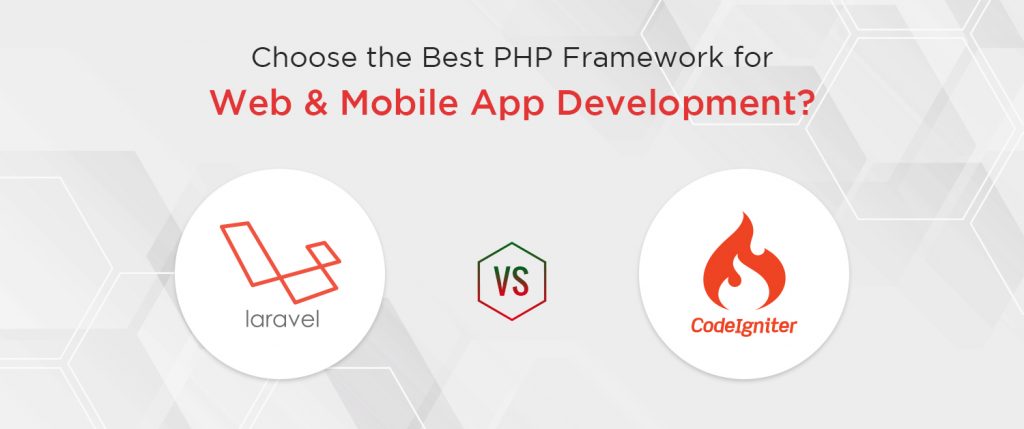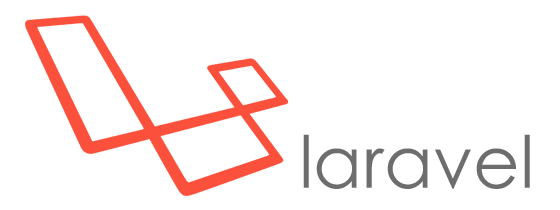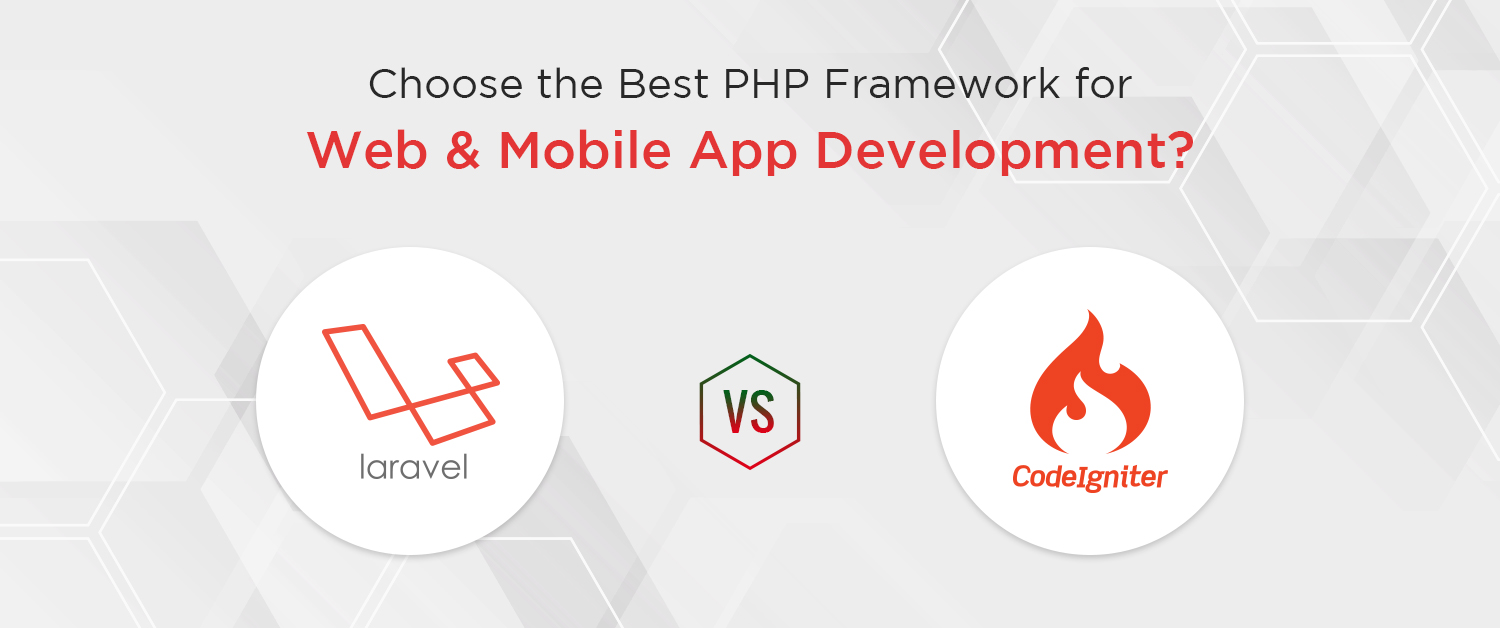
As one of the server-side scripting language, PHP has been popular among the brands for a variety of reasons. PHP is known to be used by about 78.9% of all the websites whose server-side scripting language is known (Source). Its ability to let the web developers pay keen focus on the key fundamentals, develop highly scalable web applications, and enable rapid application development with highly maintainable code contribute to this popularity.
Laravel and CodeIgniter are the two names topping the PHP realm by extending great support to the PHP development.
If you are in the process to develop a web application and facing hard times to choose between both, here we are analyzing both the PHP frameworks on various parameters to check which scales better and where. Let’s check it out.
CodeIgniter

Codeignitor is a PHP framework that enables rapid application development. It comes with a suite of extraordinary libraries that allows implementation of various operations without consuming too much time and efforts. Being one of the most expansive resources enabling hassle-free PHP development, CodeIgniter is the most sought after PHP framework.
It comes with a smaller footprint that provides simple, high-quality, and scalable web solutions. The PHP framework offers superior quality functions like code streamlining, hurdle solution, and even correct the issues encountered in professional websites.
CodeIgniter Features in Nutshell
- It is a PHP framework that offers rapid application development and uses a Model-View-Controller architecture design.
- The entire source code of CodeIgniter is limited to 2MB that makes it easier for the web developers to gain expertise on it and learn how it works.
- CodeIgniter’s innate features are capable of working independently without other components.
- It offers exhaustive documentation support backed by a great community.
- CodeIgniter comes with an extensive source of libraries and can be easily mastered by anyone having a strong grip on PHP.
Pros of CodeIgniter:
1. Smaller Footprint
Unlike other frameworks, CodeIgniter is designed as a lightweight PHP framework and is known to have a small footprint. This makes it faster as compared to any of its alternatives. Along with this, a 2MB source code helps the web developers to ensure high performing web applications. Thus, they do not have to beat around the bush focussing on upgrading the site’s performance.
2. Easy setup options
Whether you are an amateur web developer or an experienced one, CodeIgniter is easier to learn and implement. The availability of round-the-clock support in terms of active community and clear documentation. It also comes with easy setup options that enable users to configure common web development tasks.
3. Modern Separation Concept
Even though it encourages the usage of MVC, CodeIgniter does not force the developers to implement model-view-controller (MVC) architecture. That said, it also arguments that MVC enables faster development of even large and complex web applications. This modern separation concept helps programmers to use data models, libraries, controllers and HTML views.
4. Supports Web Page as Well as Database Caching
CodeIgniter is not only one of the fastest PHP frameworks, but also helps the web developers to speed up the development by combining web page and database caching under one name. This also helps to reduce the server load by letting developers to cache the web pages in fully rendered stage.
That said, web developers are not restricted to follow this way strictly though. They have the flexibility to performing caching on a per-page basis following a certain time duration.
Additionally, developers can also take the load off the database by caching database queries as simple text files using Database Caching Class.
5. Offers Built-in Security Features
Security is one of the most important aspects in the vulnerable world. And CodeIgniter takes care of it in the best form. It provides a wide array of features that allow web developers to write secure PHP applications to deter common security threats like SQL injection, cross-site scripting attacks, and remote execution. With CodeIgniter, developers also have a scope to eliminate the security threats by calling back certain functions or choosing from an extensive range of available plug-ins.
6. Easy to Extend and Customize
Scalability and customization are important for a web application to ensure popularity. The small footprint of CodeIgniter helps the programmers to ensure the same in the best possible way. The programmers can further extend CodeIgniter in multiple ways including class extensions, custom libraries, third-party plugins/ add-ons.
Cons of CodeIgniter:
1. Code Maintainability is an Issue
Enterprises these days are pretty focussed on developing applications with clean, readable, and structured code. This ensures that the applications are easy to maintain, modify, and updated in case the future requirements change.
However, unlike other PHP frameworks, CodeIgniter does not provide a scope for the same. Developers have to invest extra time and efforts to maintain and update the code.
2. Lacks Exhaustive Libraries
Despite that CodeIgniter comes in with a great set of libraries, it falls short in this aspect due to the shortage of exhaustive libraries. That said, programmers can extend the native libraries to add features.
Laravel

Laravel is another popular PHP framework that follows MVC architecture. Developed by Taylor Otwell, it was first released in the year 2011 as a free and open source PHP framework.
The extensive range of Laravel features include:
- Packages (known as Bundles) to implement small functionalities in web applications
- Built-in authorization and authentication system
- Hassle-free mail integration system
- Integration with Cached Memory for better execution
- Effortless Exception & Configuration error handling
- Resolving attitude towards common Technical Vulnerabilities
- Smooth Automation of testing work
- Segregation of business logic code from Presentation Logic
- Hassle-free URL routing configuration
- Scheduling task configuration & Management
- Secure
Pros of Laravel:
1. Leverages Latest PHP features
The feature that sets it apart from other PHP frameworks is its ability to leverage the latest features. Simply put, Laravel opens you doorsteps to develop applications with latest features like Namespaces, Interfaces, Overloading, Anonymous functions and Shorter array syntax.
2. Extensive Documentation
Each version of Laravel comes with an extensive documentation that makes it friendly to the developer community. This also encompasses a good and detailed explanation to the coding styles, methods, and classes.
3. Integration with mail services
Venturing into the digital realm calls for finding ways to ensure that your users stay abreast of the changes you bring in to your processes. What could be the best way other than keeping in touch via emails. And Laravel takes care of this very well.It comes equipped with clean API over SwiftMailer library to help businesses with the same.
4. Robus support to popular cache backends
Laravel extends strong support to the cache backends like Memcached and Redis. Web developers can also configure multiple cache configurations.
5. Comes with the built-in tool command-line tool, Artisan
Writing code for repetitive functions again does not only irritate the web developers but also makes the process longer. This in turn increases the investments. Laravel helps you eliminate the chances by offering a command line tool Artisan. PHP developers can create a skeleton code to manage repetitive tasks. It also helps you create MVC files and managing assets, including the corresponding configurations.
6. Packages and resource availability
Another benefit of using Laravel for web application development is its ability to offer npm packages and bower packages by combining framework with Gulp and Elixir. This widely comes handy in case of resource and asset revisioning. Laravel’s integration with the composer also help with dependency resolution.
7. Reduced product development cycle
Faster integrations and extensive support in the form of documentation and community helps with quick web application development.
Read More: Discover how custom web application development empowers businesses with tailored solutions for seamless operations and enhanced digital growth.
8. IoC Container
IoC or Inversion of Control is a method of generating new objects without having to bootstrap the external libraries. Simply put, web developers can access the objects regardless of where they are coding from without dealing with inflexible monolithic structures.
9. Reverse Routing
Reverse routing is one of the most useful features of Laravel that allows you to create links to the names routes. Thus, when the need to create links arise, you can directly use the router name and the framework takes care of the rest by inserting the correct URL automatically. In case the links changes in the future, these modifications are automatically reflected everywhere.
10. Eloquent ORM
Laravel paves ways for simple and intuitive ActiveRecord implementation to help you work seamlessly with the database. Thus, the models created by the web developers will have a corresponding table in the database to help you manage the corresponding data. It also offers a wide range of relationships including one-to- one, one-to- many, many-to- many, has- many- through, polymorphic relationships, and many-to- many polymorphic relationships.
Cons of Laravel:
1. Support to payment feature missing
Laravel does not come with payment support. That said, if your application is backed by the self-sustaining payment system, you don’t have to worry about this shortfall. You can also integrate one of the popular payment systems like Stripe or Paypal in your application.
2. Lack of seamless configuration between versions
The transition between various Laravel versions is not seamless. That is, if you wish to upgrade the web application’s code to the latest version, it could break the application.
3. Quality is compromised at times
Some of Laravel’s components are not well-designed. For instance, dependency injection leads to unnecessary complexity at times. Additionally, Laravel documentation has not been designed for someone at a beginner’s level. In other words, it is heavy for someone to comprehend. Besides, using Laravel requires you to learn a lot before you finally build the applications.
This makes it a bad choice for someone who is an amateur.
4. Some upgrades might be problematic
This is not solely a Laravel problem, but PHP frameworks do show problems for long term support versions as the upgrades may turn problematic. So the developers are advised to take precautions before upgrading a mobile application/website.
#5. Often fails to provide mobile app richness
Full-page reloads can be a bit heavy in mobile apps when compared to websites. Therefore, web developers tend to use the framework as backend JSON API only.
How to Leverage the Power of Laravel for Your Project?
So, now that have explored the pros of Laravel, you might be wondering how to leverage that for your project. But wait, there are a few cons of this excellent programming language as well. So, what could be done? Well, that’s where outsourcing and IT staff augmentation services come into play! Global companies across various industries use these tactics to implement cutting-edge technologies in their businesses while eliminating the cons.
So, if you lack skilled resources in your team and want to enhance or streamline your existing project using Laravel then you can follow the league of successful companies and hire Laravel developers from a trusted IT staff augmentation service provider.
On the other hand, if you have a brilliant idea and you want that to be developed using the Laravel language, then you can outsource your project to a reliable Laravel development company like us. We at Matellio have years-long experience of working with Laravel and many other cutting-edge technologies.
Laravel vs CodeIgniter

| Parameter | Laravel | CodeIgniter |
| Support of other DBMS | ORACLE, Microsoft SQL Server, IBM DB2, MYSQL, PostgreSQL, OrientDB, and JDBC compatible. | MySQL, PostgreSQL, Microsoft BI, and MongoDB with additional support to Microsoft SQL Server, Oracle, DB2, and others. |
| Popularity & current trends | With expressive coding style, Laravel is the wide preferred by the seasoned developers. | The ease of use makes it the most widespread PHP framework. |
| Structure and Updates | Follows MVC and comes with CLI tool known as Artisan. | Follows MVC and is loosely bound on object-oriented programming. |
| Built-in Modules | Designed with built-in modularity features that allow developers to divide a project into small modules through the bundle. | Does not offer any built-in modularity features. Thus, developers need to create and maintain modules by using Modular Extension. |
| Support for RESTful API | The RESTful Controllers empower developers to manufacture an assortment of REST APIs without spending extra time. | Does not facilitate streamlined development of REST APIs. |
| Template Engine and API Building | Comes with a simple but robust template engine like Blade that allows PHP programmers to optimize the web app’s performance by enhancing and manipulating views. | Does not offer any built-in template engine. The developers are required to integrate it with a template engine tool like Smarty to conduct common tasks and improve the performance of the website. |
| Online help and Libraries | Laravel’s offer its official documentation which is very elaborate and helpful. However, you can get additional help from Laracast.com. | The CodeIgniter offer plenty of built-in functionality, and their website has a useful guide for which you can use without any prior knowledge. |
| Data Base Model | Relational Object-Oriented | Object Oriented |
| Template Language | Blade Template Engine | PHP proprietary |
| Programming Paradigm | Component Oriented | Object-Oriented Event Driven Functional |
| HTTP Support | Allows programmers to define custom HTTPs routes. The developers can also create a specific URL for each HTTPS route. | Does not support HTTPS fully. Thus, developers can use URL to keep the data transmission secure by creating pats. |
| Authentication | The Authentication Class feature provided by Laravel makes it easier for developers to implement authentication and authorization rules. | CodeIgniter doesn’t come with built-in authentication features. So, developers need to authenticate and authorize users by writing custom CodeIgniter extensions. |
| Unit Testing | It allows developers to check the application code thoroughly and continuously with the help of PHPUnit. | CodeIgniter doesn’t have any inbuilt unit testing tools. Therefore, developers need to use additional unit testing tools to assess the quality of the application and code. |
| Learning Curve | Laravel offers many additional features which are difficult to learn for beginners. | The beginners find it easier to learn and use CodeIgniter. |
| Prominent Companies using the product | 9GAG, Union, Geocodio | Buffer, Machester.com, Webedia |
So Finally, who Wins?
Logically speaking, none of them can be referred to as a clear winner or loser. While one outshines other on some aspects, other one has a plethora of reasons to take an upper hand. In this case, if you want to choose what suits best for your business application, it depends on multiple factors including the type of applications, your goals, business model, etc.
An expert web development company like Matellio can surely help you decode what goes best for you. Maybe you can share your idea with us now and have your queries answered quickly.






